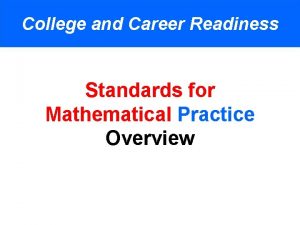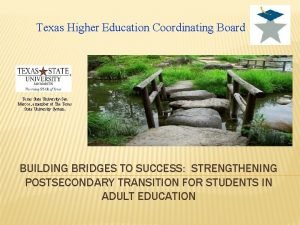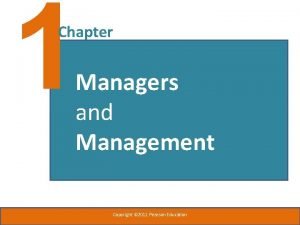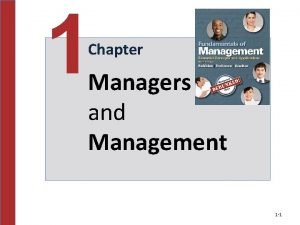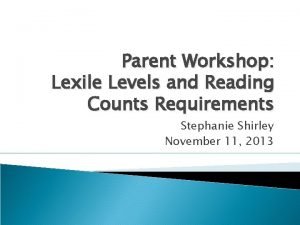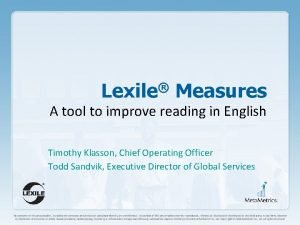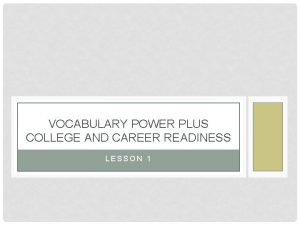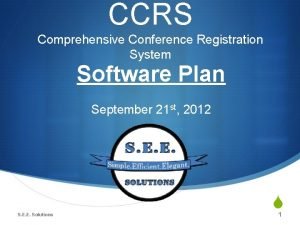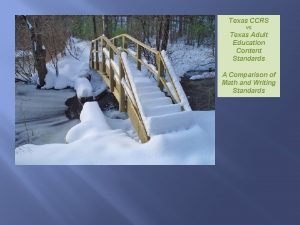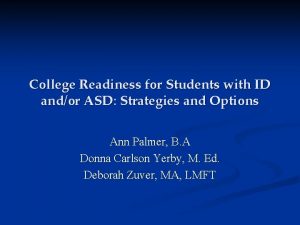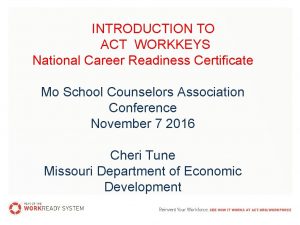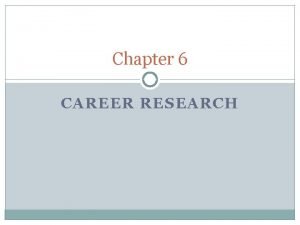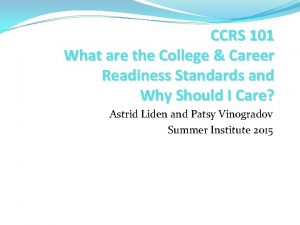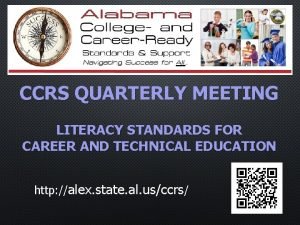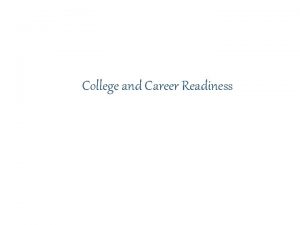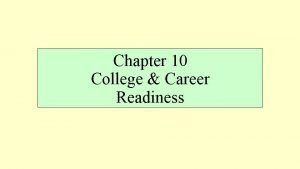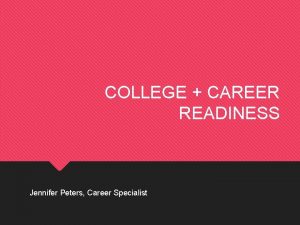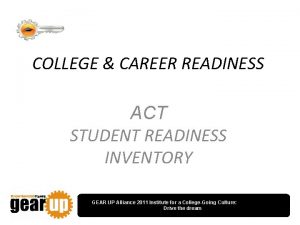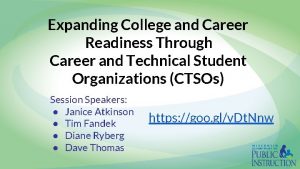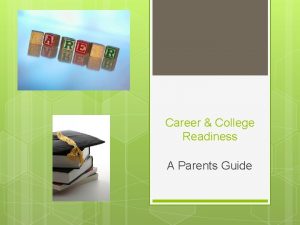REDEFINING COLLEGE READINESS College Career Readiness Standards CCRS














- Slides: 14

REDEFINING COLLEGE READINESS College Career Readiness Standards (CCRS)

Definition of College Readiness ■ “College readiness can be defined operationally as the level of preparation a student needs in order to enroll and succeed—without remediation—in a creditbearing general education course at a postsecondary institution that offers a baccalaureate degree or transfer to a baccalaureate degree program. “Succeed” is defined as completing entry-level courses at a level of understanding and proficiency that makes it possible for the student to consider taking the next course in the sequence or the next level course in the subject area. ” ■ “The college-ready student envisioned by the definition is able to understand what is expected in a college course, and cope with the content knowledge that is presented, and can take away from the course the key intellectual lessons and dispositions the course was designed to convey and develop. ” p. 5 -6

How is college different from high school? ■ ■ Students are expected to be adults Courses are faster paced, different goals, emphasize different aspects of material College instructors emphasize a series of key thinking skills “…[C]ollege courses require students to read 8 -10 in the same time that a high school class requires only one or two. ” ■ College students must write multiple papers at the same time, and the papers must be ”well reasoned, well organized, and well documented with evidence from credible sources…. ” ■ Expected to work in small groups in and out of class on complex problems and projects. ■ Students are expected to be self-reliant who can recognize when they are having problems and know when to seek help from multiple sources.

What’s being reported ■ College freshman not spending enough time studying (high failure rates) ■ Relationship between teacher and students ■ Need different array of learning strategies and coping skills to be successful

Current means to determine college readiness ■ Course titles ■ GPA ■ Tests ■ Performance in college courses – Remedial courses – General Education

Components in Definition of College Readiness

Key Cognitive Strategies ■ “Several studies of college faculty members nationwide, regardless of the selectivity of the university, expressed near-universal agreement that most students arrive unprepared for the intellectual demands and expectations of postsecondary (Conley, 2003 a). ” p. 12 ■ Intellectual openness ■ Inquisitiveness ■ Analysis ■ Reasoning, argumentation, proof ■ Interpretation ■ Precision and accuracy ■ Problem solving

Academic Knowledge and Skills (content knowledge) ■ ■ Core Academic Subjects Knowledge and Skills – English – Math – Science – SS – World languages – Arts Academic Behaviors – Self-awareness – Self-monitoring (metacognition) – Self-control of behaviors for academic success Contextual Skills and Awareness – Norms/values of college context – Human relationships Overarching academic skills – Writing – Research

Possible Ways to Measure the Dimensions of the Definition pp. 2022 ■ Key Cognitive Strategies – Collection of evidence ■ Key Content Knowledge Measurements – End of course ■ Academic Behaviors Measurement – Survey/Inventory – Discussion between to assess the behavior in practice ■ Contextual Skills and Awareness Measurement – Questionnaires – Quality of the program

Implications of the Definitions pp. 2224 ■ Gauging College Prep Programs – How will does each H. S. prep students – Admissions needs to evolve ■ Gauging Effects in College – Students’ comfort in entry-level gen ed courses – Open to pursue a wide variety majors – Students who don’t get much out of college

What Can Schools and Students Do to Foster College Readiness? pp. 2527 ■ Create a culture focused on intellectual development. ■ Specify core knowledge and skills. ■ Provide necessary supports.

■ Specify Core – Organize curriculum in each subject around a set of core concepts ■ Provide necessary supports to students – Demystify college prep and demystify the process ■ Provide necessary supports to teachers – Well equipped and properly prepared – Professional development – Collaboration between secondary and post-secondary teachers ■ Create a Culture Focused on Intellectual Development – Interact with challenging academic content – Key cognitive strategies should be scaffolded – Students take more control over their learning – Intellectual climate

What can students do to Develop Their College Readiness? p. 28

■ College is a realistic goal ■ Know what is means to be ready for college ■ Begin preparing their freshman year ■ Have a plan ■ Use information given to them on college academics and financial requirements
 College and career readiness standards math
College and career readiness standards math Ccrs standards texas
Ccrs standards texas Redefining airmanship
Redefining airmanship Factors reshaping and redefining management
Factors reshaping and redefining management Factors that are reshaping and redefining the manager's job
Factors that are reshaping and redefining the manager's job Fundamental of care
Fundamental of care Lexile scale
Lexile scale Lexile measure
Lexile measure Vocabulary power plus for college and career readiness
Vocabulary power plus for college and career readiness Ccrs software
Ccrs software Texas ccrs
Texas ccrs Aeb vru
Aeb vru Wake tech admissions
Wake tech admissions National career readiness certificate
National career readiness certificate Chapter 6 career readiness
Chapter 6 career readiness
